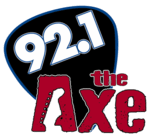WWGO
WWGO (92.1 FM) is a radio station broadcasting a Classic rock format. Licensed to Charleston, Illinois, the station is owned by Cromwell Radio Group, through licensee The Cromwell Group, Inc. of Illinois.[4]
  | |
| City | Charleston, Illinois |
|---|---|
| Broadcast area | Charleston, Illinois Mattoon, Illinois |
| Frequency | 92.1 MHz (HD Radio) |
| Branding | 92.1 the Axe |
| Slogan | Nothing But the Greatest Classic Rock of All-Time We Are Classic Rock 92.1 The Axe |
| Programming | |
| Format | Classic rock HD2: Sports "Victory 103.9" |
| Ownership | |
| Owner | Cromwell Radio Group (The Cromwell Group, Inc. of Illinois) |
| Sister stations | WMCI, WCBH |
| History | |
| First air date | October 1, 1965 (as WEIC-FM)[1] |
| Former call signs | WEIC-FM (1965[2]-1993)[3] WHQQ (1993-1997)[3] |
| Technical information | |
| Facility ID | 72317 |
| Class | A |
| ERP | 6,000 watts |
| HAAT | 100 meters |
| Transmitter coordinates | type:city 39°31′40.00″N 88°21′23.00″W |
| Translator(s) | 103.9 W280EK (Mattoon, relays HD2) |
| Links | |
| Webcast | Listen Live Listen Live (HD2) |
| Website | www www |
History
The station began broadcasting October 1, 1965, and originally held the call sign WEIC-FM.[1][2] The station was originally owned by Friendly Broadcasters, Inc.[2] In 1967, the station was sold to Community Communications Associates, along with its AM sister station.[2][5]
The station originally simulcast the MOR format of its sister station WEIC 1270, but in December 1971, the station adopted a progressive rock format, while its sister station adopted a top 40 format.[6][1] By 1973, the station was simulcasting the top 40 programming of WEIC 1270 during the day, while airing country music from 6 p.m. to 10 p.m. and progressive rock 10 p.m. to 2 a.m.[7] In the following years, the station would return to simulcasting AM sister station most of the time.[8] The station was purchased by Withers Broadcasting in 1975.[2] In 1980, the station was sold to Macomb Broadcasting Co., along with its AM sister station, for $700,000.[9]
By 1984 the station was airing an adult contemporary format, separate from its AM sister station.[10] In 1984, the station was sold to Steve Garman, along with its AM sister station, for $628,000.[11] The station continued airing an adult contemporary format into the early 1990s.[12]
In 1993, the station's call sign was changed to WHQQ,[3] and the station adopted an oldies format, playing music from the late 1950s to the early 1970s.[13][14] The station was sold to The Cromwell Group later that same year.[15] In 1997, the station's call sign was changed to WWGO,[3] and the station's format was changed from oldies to dance/CHR, branded "The Party", with the WHQQ call sign and its oldies format moving to 98.9.[16] By 2002, the station was airing a rock format.[17]
References
- Broadcasting Yearbook 1971, Broadcasting, 1971. p. B-60. Retrieved July 11, 2018.
- History Cards for WWGO, fcc.gov. Retrieved July 11, 2018.
- Call Sign History, fcc.gov. Retrieved July 13, 2018.
- WWGO fcc.gov. Accessed September 29, 2012
- History Cards for WEIC, fcc.gov. Retrieved July 11, 2018.
- "Charleston to Top 40 & Rock", Billboard, January 1, 1972. p. 10. Retrieved July 11, 2018.
- Hall, Claude. "Vox Jox", Billboard, October 20, 1973. p. 34. Retrieved July 13, 2018.
- Broadcasting Yearbook 1979, Broadcasting, 1979. p. C-63. Retrieved July 13, 2018.
- "Changing Hands", Broadcasting, February 25, 1980. p. 77. Retrieved July 13, 2018.
- Broadcasting/Cablecasting Yearbook 1984, Broadcasting/Cablecasting, 1984. p. B-76. Retrieved July 13, 2018.
- "Changing Hands", Broadcasting, April 9, 1984. p. 94. Retrieved July 12, 2018.
- The M-Street Radio Directory. 1992/1993. p. 137. Retrieved July 13, 2018.
- "WEIC-FM Changes Format, Call Letters", Journal Gazette. May 5, 1993. p. A9.
- The M-Street Radio Directory. 1994. p. 146. Retrieved July 13, 2018.
- "Proposed Station Transfers", The M-Street Journal. Vol. 10 No. 29. July 21, 1993. p. 4. Retrieved July 14, 2018.
- "Format Changes", The M-Street Journal. Vol. 14 No. 45. November 12, 1997. p. 1. Retrieved July 13, 2018.
- Devine, Cathy (2002). The M-Street Radio Directory. 11th Edition 2002-2003. p. 185. Retrieved July 14, 2018.
External links
- Cromwell Radio Mattoon
- WWGO's website
- WWGO in the FCC's FM station database
- WWGO on Radio-Locator
- WWGO in Nielsen Audio's FM station database